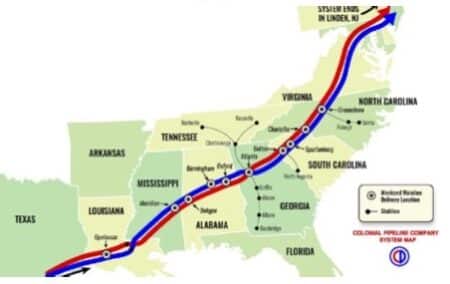The operator of the biggest gasoline pipeline in the U.S. shut down operations on Friday following a ransomware attack that threatens turmoil on energy markets and disruption to the supply of gas and diesel to the East Coast.
Colonial Pipeline said that it “proactively took certain systems offline to contain the threat, which has temporarily halted all pipeline operations, and affected some of our IT systems.”
The pipeline is the main source of gasoline, diesel and jet fuel to the East Coast. It has a capacity of about 2.5 million barrels a day on its system from Houston to North Carolina, and another 900,000 barrels a day to New York.
The attackers appeared to use a ransomware group called DarkSide. ‘Ransomware’ is a type of malicious software designed to block access to a computer system until a sum of money is paid to unblock it.
Hacking threats to critical infrastructure have grown. The White House responded last month with a plan to try to increase the security of utilities and their suppliers. Pipelines play a central role in many parts of the U.S. economy.
The attack comes as the energy industry gears up for summer travel and stronger fuel demand, as pandemic economic restrictions are eased. A cyber-attack brought down the communication systems of several U.S. natural gas pipelines operators in 2018.
The federal government is assessing the implications of the incident, including ways of avoiding disruption to supply and helping the company restore operations as quickly as possible, a White House spokesperson said.
The main two Colonial lines out of the Houston refining hub have not been full for months. Demand has fallen to its lowest in decades because of the pandemic. Consequently fuel markets served by the line might not face supply shortages.
[Map: colonial-pipeline-company-system-map-1474297488144-4018404-ver1-0.jpg]

